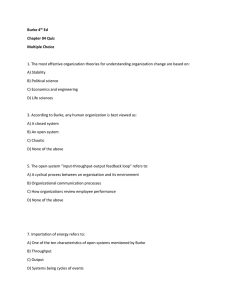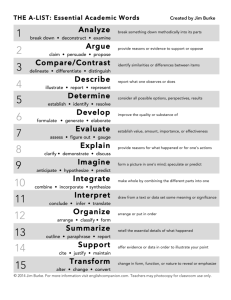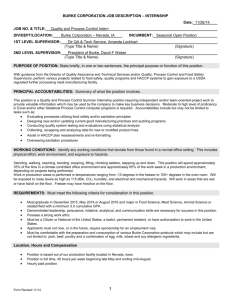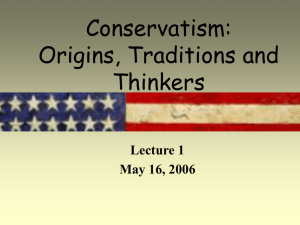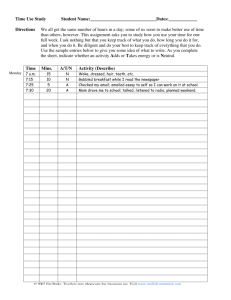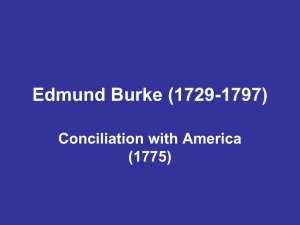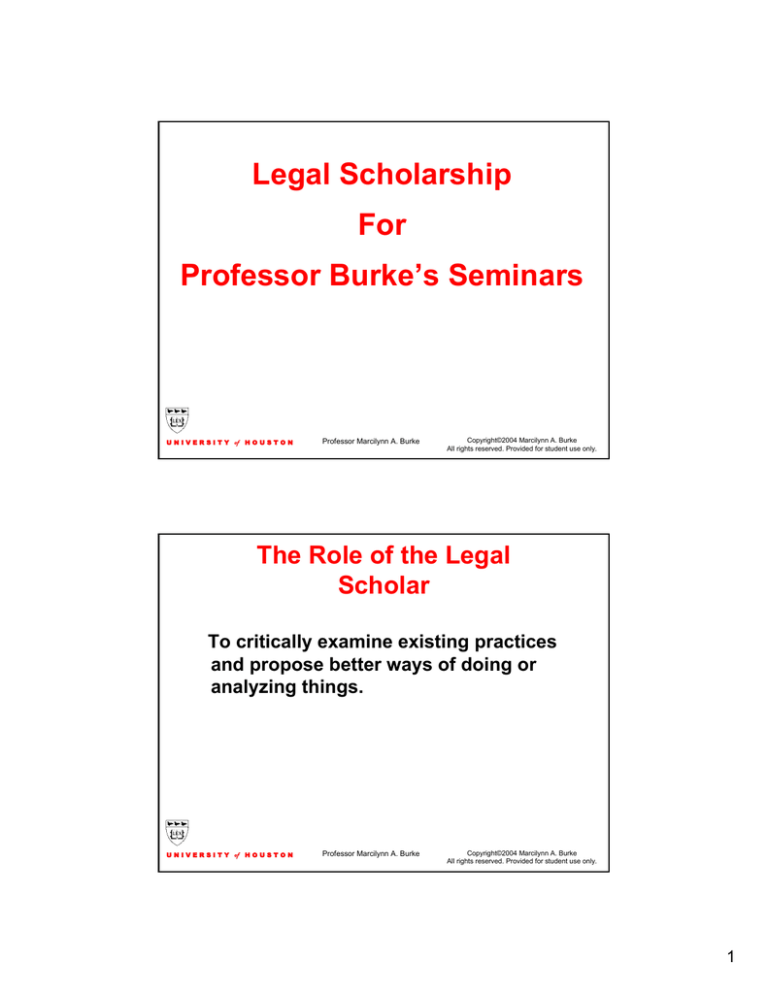
Legal Scholarship
For
Professor Burke’s Seminars
U N I V E R S I T Y of H O U S T O N
Professor Marcilynn A. Burke
Copyright©2004 Marcilynn A. Burke
All rights reserved. Provided for student use only.
The Role of the Legal
Scholar
To critically examine existing practices
and propose better ways of doing or
analyzing things.
U N I V E R S I T Y of H O U S T O N
Professor Marcilynn A. Burke
Copyright©2004 Marcilynn A. Burke
All rights reserved. Provided for student use only.
1
Types of Legal Scholarship
•
Case Cruncher (Duncan)
•
Law Reform (Buckles)
•
Legislative Note (Kettles)
•
Interdisciplinary (Chandler)
•
Legal History (Joyce)
•
Comparative (Curran)
•
Casenote (Reeder)
U N I V E R S I T Y of H O U S T O N
Professor Marcilynn A. Burke
Copyright©2004 Marcilynn A. Burke
All rights reserved. Provided for student use only.
Case Cruncher
(Duncan)
•
Analyzes case law in an area that is
confused, in conflict, or in
transition.
•
Makes claims that doctrine is
antiquated or incoherent and
needs to be reshaped.
•
Often offers a solution to the
conflict or problem.
U N I V E R S I T Y of H O U S T O N
Professor Marcilynn A. Burke
Copyright©2004 Marcilynn A. Burke
All rights reserved. Provided for student use only.
2
Law Reform
(Buckles)
•
Argues that a legal rule is bad, has
evil consequences, is inequitable
or unfair.
•
Shows how to change the rule to
avoid these problems.
U N I V E R S I T Y of H O U S T O N
Professor Marcilynn A. Burke
Copyright©2004 Marcilynn A. Burke
All rights reserved. Provided for student use only.
Legislative Note
(Kettles)
•
Analyzes proposed or recently
enacted legislation.
•
Often analyzes the legislation
section by section, offering
comments, criticisms, and
sometimes suggestion for
improvement.
U N I V E R S I T Y of H O U S T O N
Professor Marcilynn A. Burke
Copyright©2004 Marcilynn A. Burke
All rights reserved. Provided for student use only.
3
Interdisciplinary
(Chandler)
•
Shows how insights from another
field can enable law to deal better
with problems.
•
Sociology, psychology, economics,
etc.
U N I V E R S I T Y of H O U S T O N
Professor Marcilynn A. Burke
Copyright©2004 Marcilynn A. Burke
All rights reserved. Provided for student use only.
Legal History
(Joyce)
Describes the origins and development
of a legal rules or institution, perhaps
shedding light on its current
operations or shortcomings.
U N I V E R S I T Y of H O U S T O N
Professor Marcilynn A. Burke
Copyright©2004 Marcilynn A. Burke
All rights reserved. Provided for student use only.
4
Comparative
(Curran)
• Explicitly makes comparison between
or among different legal systems.
• Focuses on differences and
similarities, and perhaps gives
reasons for the differences and
similarities or analyzes the
significance for the cultures being
studied.
• May show that other legal systems
treat a problem more effectively,
equitably, or humanely than the U.S.
system does.
U N I V E R S I T Y of H O U S T O N
Professor Marcilynn A. Burke
Copyright©2004 Marcilynn A. Burke
All rights reserved. Provided for student use only.
Casenote
(Reeder)
Examines a recent decision,
together with its antecedents,
deficiencies, and likely
consequences.
U N I V E R S I T Y of H O U S T O N
Professor Marcilynn A. Burke
Copyright©2004 Marcilynn A. Burke
All rights reserved. Provided for student use only.
5
Finding a Problem/Topic
• Cases read for class
• Class discussions
• Questions in casebooks after each
case
• Recent Supreme Court decisions
• Faculty members
U N I V E R S I T Y of H O U S T O N
Professor Marcilynn A. Burke
Copyright©2004 Marcilynn A. Burke
All rights reserved. Provided for student use only.
Finding a Problem/Topic cont’d
• Practicing lawyers
• Newspapers
• Westlaw Bulletin and Westlaw
Topical Highlights
• http://www.lawtopic.org
U N I V E R S I T Y of H O U S T O N
Professor Marcilynn A. Burke
Copyright©2004 Marcilynn A. Burke
All rights reserved. Provided for student use only.
6
What Does Your
Professor Want?
U N I V E R S I T Y of H O U S T O N
Professor Marcilynn A. Burke
Copyright©2004 Marcilynn A. Burke
All rights reserved. Provided for student use only.
Characteristics
Good legal scholarship should make
1. a claim that is
2. novel,
3. nonobvious,
4. useful, and
5. sound.
Good legal scholarship is wellwritten and well organized.
U N I V E R S I T Y of H O U S T O N
Professor Marcilynn A. Burke
Copyright©2004 Marcilynn A. Burke
All rights reserved. Provided for student use only.
7
The Claim
Your Basic Thesis
Descriptive: Telling readers
something that they did not know
about the world: what courts have
done, how a legal rule changes
people’s behavior, or why a rule has
developed in a particular way.
Prescriptive: Suggesting what should
be done. Criticizing judicial opinions,
proposing how legal decision-makers
should solve a problem.
U N I V E R S I T Y of H O U S T O N
Professor Marcilynn A. Burke
Copyright©2004 Marcilynn A. Burke
All rights reserved. Provided for student use only.
Novelty
• Add to the body of professional
knowledge.
• Say something new to those who
work in the field.
• Preemption. Must review the
literature to make sure that you are
writing something with a
suggestion, slant, idea, or analysis
that has not appeared before.
U N I V E R S I T Y of H O U S T O N
Professor Marcilynn A. Burke
Copyright©2004 Marcilynn A. Burke
All rights reserved. Provided for student use only.
8
Nonobviousness
• Add some twist that most observers
would not have thought of. Think
creatively.
• Do not just apply settled law or wellestablished arguments to slightly
new facts.
U N I V E R S I T Y of H O U S T O N
Professor Marcilynn A. Burke
Copyright©2004 Marcilynn A. Burke
All rights reserved. Provided for student use only.
Utility
• Make as useful as possible for those
interested in this area of law.
• Focus on issues left open.
• Apply your argument to other
jurisdictions.
• Incorporate prescriptions with your
descriptive findings.
• Consider making a more politically
feasible proposal.
U N I V E R S I T Y of H O U S T O N
Professor Marcilynn A. Burke
Copyright©2004 Marcilynn A. Burke
All rights reserved. Provided for student use only.
9
Soundness
• Test your proposal on different
cases or facts to determine if your
proposal achieves the desired goals
under all circumstances.
• Acknowledge the weaknesses of
your proposal and use them to
refine the proposal.
U N I V E R S I T Y of H O U S T O N
Professor Marcilynn A. Burke
Copyright©2004 Marcilynn A. Burke
All rights reserved. Provided for student use only.
Structure of the Paper
I.
Introduction
II.
Background
III. Analysis
IV. Conclusion
U N I V E R S I T Y of H O U S T O N
Professor Marcilynn A. Burke
Copyright©2004 Marcilynn A. Burke
All rights reserved. Provided for student use only.
10
Introduction
• Describes or summarizes the subject
matter.
• Frames the issue.
• Plainly states the thesis.
• Provides a roadmap for the rest of the
paper.
• Part I sets out X
• Part II analyzes X and concludes Y
U N I V E R S I T Y of H O U S T O N
Professor Marcilynn A. Burke
Copyright©2004 Marcilynn A. Burke
All rights reserved. Provided for student use only.
Background
• Factual
• Legal
• Methodological
• Specific
• Necessary to advance thesis
U N I V E R S I T Y of H O U S T O N
Professor Marcilynn A. Burke
Copyright©2004 Marcilynn A. Burke
All rights reserved. Provided for student use only.
11
Analysis
• Focal point of paper.
• Original and closely reasoned.
• Building up to a convincing
conclusion.
U N I V E R S I T Y of H O U S T O N
Professor Marcilynn A. Burke
Copyright©2004 Marcilynn A. Burke
All rights reserved. Provided for student use only.
Footnotes
• Used extensively.
• Documenting the text – providing
the authority and bibliography
• Avoiding plagiarism – attributing the
borrowed text and ideas to their
original sources
• Textual – allowing the writer to
express ideas that do not fit neatly
in the straight and narrow path of
traditional legal reasoning
U N I V E R S I T Y of H O U S T O N
Professor Marcilynn A. Burke
Copyright©2004 Marcilynn A. Burke
All rights reserved. Provided for student use only.
12
Legal Authorities: Research
• Casebooks, Hornbooks, and
Encyclopedias (in the beginning)
• Statutes
•
U.S. Code
•
Texas statutes
•
http://www.capitol.state.tx.us/
• Regulations
•
Code of Federal Regulations (C.F.R.)
•
Federal Register
•
http://www.gpoaccess.gov/nara/index.html
U N I V E R S I T Y of H O U S T O N
Professor Marcilynn A. Burke
Copyright©2004 Marcilynn A. Burke
All rights reserved. Provided for student use only.
Legal Authorities: Research
• Cases
• Proposed Legislation
• http://thomas.loc.gov
• http://www.capitol.state.tx.us/
• Law Review Articles
• Newspaper and Magazine Articles
U N I V E R S I T Y of H O U S T O N
Professor Marcilynn A. Burke
Copyright©2004 Marcilynn A. Burke
All rights reserved. Provided for student use only.
13
Sources on Writing
• Eugene Volokh, Academic Legal
Writing. 2d ed. (Foundation Press
2005).
• Elizabeth Fajans & Mary R. Falk,
Scholarly Writing for Law Students
(2d ed. West 2000).
• Williams Strunck Jr. and E. B. White,
The Elements of Style (4th Ed. 2001).
• Plain English for Lawyers (4th ed.
Carolina Academic Press 2001).
• http://www.bartleby.com/usage/
U N I V E R S I T Y of H O U S T O N
Professor Marcilynn A. Burke
Copyright©2004 Marcilynn A. Burke
All rights reserved. Provided for student use only.
Ask Your
Professor What
She Wants
U N I V E R S I T Y of H O U S T O N
Professor Marcilynn A. Burke
Copyright©2004 Marcilynn A. Burke
All rights reserved. Provided for student use only.
14
How You Will Be Graded?
• Carefully read the syllabus and any
materials provided concerning
requirements.
• If you have questions about or are
unsure of how to meet the
requirements, ask me.
U N I V E R S I T Y of H O U S T O N
Professor Marcilynn A. Burke
Copyright©2004 Marcilynn A. Burke
All rights reserved. Provided for student use only.
How You Will Be Graded?
• Included in your final grade will be
the quality of-• your first draft,
• revisions to reflect my comments
on your outline and first draft,
• compliance with citation and
other formats, and
• your class participation.
U N I V E R S I T Y of H O U S T O N
Professor Marcilynn A. Burke
Copyright©2004 Marcilynn A. Burke
All rights reserved. Provided for student use only.
15
Meet All Requirements
• Make sure that your paper will
satisfy the requirements of your
particular LL.M. program.
• Page length – 40 or 60 pages
• Grade needed – “B” or “C”
• Etc.
• Though it is called a “thesis”, it
should be in the format of a law
review article.
U N I V E R S I T Y of H O U S T O N
Professor Marcilynn A. Burke
Copyright©2004 Marcilynn A. Burke
All rights reserved. Provided for student use only.
Observe All Deadlines
• I will lower your grade for late
assignments.
• I will be very unhappy with late
assignments.
U N I V E R S I T Y of H O U S T O N
Professor Marcilynn A. Burke
Copyright©2004 Marcilynn A. Burke
All rights reserved. Provided for student use only.
16

